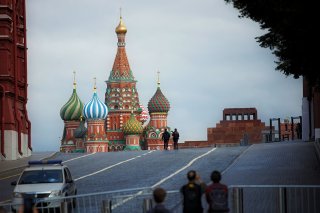Reimagining Russia
After the end of the Ukraine War, can U.S.-Russia relations be set on a path to strategic realignment?
The depiction of Russia as an inescapable enemy is a dangerous narrative that will only undermine the long-term interests of the United States and the West by fostering permanent strategic ties between Russia and China. Notwithstanding the challenges posed by the Ukraine War, Washington must sooner or later develop a formula to exercise the kind of three-cornered diplomacy between Moscow, Beijing, and Washington developed by President Richard Nixon and Secretary of State Henry Kissinger that helped win the Cold War and bring stability between these three powers. At the same time, Washington diplomats will have to help find a solution to the Ukraine war that somehow will be acceptable to all protagonists.
After the fall of the Berlin Wall, Russians welcomed Americans, anticipating the friendship promised by Reagan to Gorbachev. This opportunity to forge a new relationship dissipated over the ensuing years with NATO’s absorption of former Warsaw Pact countries. Russia’s disillusionment culminated when NATO rejected Yeltsin’s appeal for Russia also to join the alliance. After that, relations steadily deteriorated and have now reached the breaking point with Moscow’s Ukraine invasion.
Despite their centuries of contribution to Western science, music, and literature, Russians have always harbored deep-seated insecurities about their relationship with the West, bordering, some would say, on paranoia. Notwithstanding those issues, Russia’s first historical impulse was to face west toward Europe, not east. With the debacle created by the Ukraine War, Russia finds itself isolated from the West and with no real option but to forge a closer strategic relationship with its historical rival and protagonist, China.
As Washington and its allies search for a formula to resolve Ukraine on terms acceptable to all parties, they should take advantage of that peace-making process as an opportunity to reopen a dialogue with Russia. Addressing Moscow’s historical grievances over NATO expansion as an integral part of ending the Ukraine war can lead not only to the cessation of hostilities but to a more stable, long-term balance of power in Europe. While Ukraine’s sovereignty cannot be sacrificed, Moscow itself should not be confronted with terms that can only lead to more Russian grievances, thereby making conflict and instability a continuing inevitability.
The current “peace through threat” approach against Russia will not be ultimately productive. Reimagining Russia relations will require a more positive, multi-faceted approach. Diplomatic, not military dynamics, should be prioritized, and diplomats should be led by those who understand the history and cultural ties between Russia and the West. Returning to regular high-level dialogues and working groups focused on specific areas of possible economic and security cooperation will be essential. Despite the Ukraine war, for example, the United States and Russia have managed to continue the International Space Station program.
As painful as it might be for many to accept at this point, Ukraine’s status as a neutral buffer state—like Finland during the Cold War—might be seriously reconsidered as part of any potential peace package. President Zelensky himself made that offer to Moscow after Russia first invaded in March 2022.
While there has been bitter devastation and loss for Ukraine since then, making neutrality understandably tougher for Ukraine to accept at this point, that option remains a practical avenue for exploration. In fact, neutrality should now become an even more immediate consideration since NATO recently announced that it will not accept Ukraine for alliance membership until Kyiv better addresses corruption in the defense industry.
Along with neutrality, a new regional security framework that would include NATO and Russia as partners could also be considered to address regional security issues. Finally, the potential for internal Ukrainian constitutional reforms, creating a new governance approach for Russian ethnic minorities in Ukraine, could be raised along with neutrality and security framework considerations.
The reigning culture of institutionalized Russophobia within Western governments and media is not conducive to developing momentum for peace negotiations. The Ukraine War should be resolved under a blueprint that not only preserves respect for sovereignty and borders but sets the stage for rapprochement between Russia and the West. The present path, which appears bent on punishing Moscow, will not lead to better long-term stability in the region. Instead, it is most likely to produce, at best, a frozen conflict with the same kind of negative consequences for stability as seen in Korea over six decades.
Prince Klemens von Metternich ended the Napoleonic Wars, which cost millions of lives over twelve years, by allowing a defeated France to join the victorious allies, Austria, Prussia, Russia, and Great Britain, in 1815 as a member of the Concert of Europe. That arrangement helped to create a stable peace in Europe for a good part of the nineteenth century. Equally creative diplomacy will be needed today to help solve yet another bitter and destabilizing conflict in the heart of Europe.
Dave Harvilicz is a lawyer and entrepreneur based in California who studied at Moscow State University. He served as Acting Assistant Secretary for CESER (Cybersecurity, Energy Security, and Emergency Response) in the U.S. Department of Energy. Follow him on X: @DaveHarvilicz.
Image: Demm28 / Shutterstock.com.

